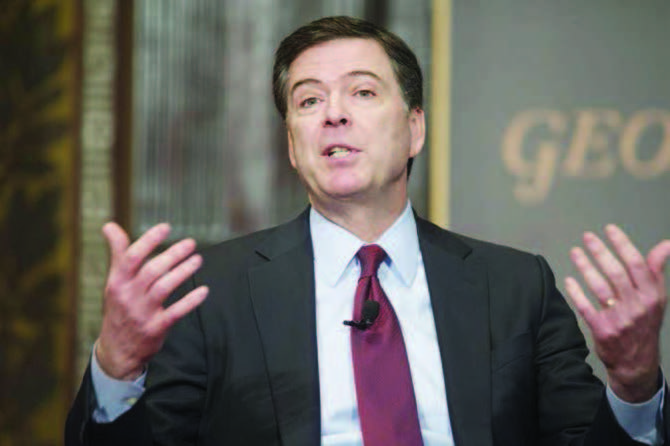
GEORGETOWN (TIP): In an unusually frank, personal speech, FBI Director James B. Comey on Thursday, February 12, acknowledged “hard truths” about racial bias in policing, saying there’s a desperate need for law enforcement to understand the steep challenges facing minority communities and for American communities to understand the challenges facing police.
“We are at a crossroads,” Comey said. “We can turn up the music on the car radio and drive around these problems. Or we can choose to have an open and honest discussion about what our relationship is today – what it should be, what it could be and what it needs to be.”
Comey spoke of his respect for the police and referred to the days when his grandfather, the child of Irish immigrants, served as a police officer in Yonkers, N.Y.
“A century ago, the Irish knew well how American society – and the police -viewed them: as drunks, ruffians and criminals,” Comey said. “Law enforcement’s biased view of the Irish lives on in the nickname we still use for the vehicle that transports groups of prisoners; it is, after all, the ‘paddy wagon.’ “In the speech, delivered to a group of Georgetown University students, Comey stepped deeper into the politically charged debate on race, policing and the use of force just 18 months after becoming director of the FBI.In 2009, Attorney General Eric H. Holder Jr. raised the ire of the White House with a speech in which he said the United States was a “nation of cowards” when it came to discussing race. Comey’s remarks were perhaps less provocative but still remarkably candid for a director of the FBI.
At one point in his speech, Comey cited the song “Everyone’s a Little Bit Racist” from the Broadway musical “Avenue Q” in making the case that everyone makes judgments based on race.
“No one’s really color blind,” Comey said.He said that, to remind himself of the bitter history of race in America, he keeps the one-page order that former attorney general Robert F. Kennedy signed to wiretap Martin Luther King Jr.
Comey’s speech follows a series of high-profile cases in which police have been accused of racial bias, including the August shooting of Michael Brown, an unarmed black teenager in Ferguson, Mo., by a white police officer, as well as the choking death of Eric Garner, an unarmed black man in New York in July.
He said that there is a need for better data about encounters between police and the communities they protect.
“Not long after riots broke out in Ferguson, I asked my staff to tell me how many people shot by police were African American. They couldn’t, and it wasn’t their fault,” he said. “Demographic data regarding officer-involved shootings is not consistently reported to us. .?.?.?Because reporting is voluntary, our data is incomplete and therefore, in the aggregate, unreliable.”
“It’s ridiculous that I can’t tell you how many people have been shot by the police in this country,” he later said in response to a student’s question.
Comey said new FBI recruits, who are overwhelmingly white and male, are taken to the Holocaust Memorial as part of their training. Since he became director, he said, the recruits are now also taken to the Martin Luther King Memorial.Law enforcement attracts people who “want to do good for a living,” he added.”But something happens to people” in law enforcement, he said. Because a “hugely disproportionate percentage of street crime is committed by people of color,” officers can’t help but be influenced by cynicism, he said.
“We must find a way to see each other more clearly,” he said. “It is hard to hate up close.”





Be the first to comment